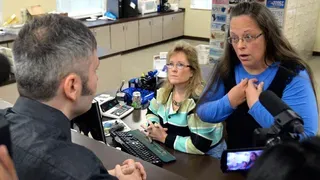October 25, 2012
Politics Unusual: Is DOMA Done?
Chris Sosa READ TIME: 3 MIN.
For the past several weeks, political chatter has centered on the debates. From Obama's sleepy performance in the first debate, to "Uncle Joe" Biden's scoffing and calling out of GOP VP nominee Paul Ryan, to the president calling Mitt Romney "offensive" for his comments on the assassination of the US Ambassador to Libya Chris Stevens. However, the real news to the gay community from the debates is not really news at all... they forgot about us. Not a single mention; not a word on the Employment Non Discrimination Act (President Obama supports the law, while Mitt Romney has said he doesn't see the need for it.), no comments on their stances on gay marriage, and nothing on the fight to repeal DOMA (the Defense of Marriage Act), a fight that was bolstered last week by the 2nd U.S. Circuit Court of Appeals in New York, which ruled that the law is unconstitutional. Upon hearing about the court's ruling, George Castrataro, a lawyer whose firm specializes in LGBT law, said:
A federal appeals court in New York has become the second federal court to strike down the Defense of Marriage Act. Ultimately, the court concluded that DOMA's denial of federal benefits to married same-sex couples was unconstitutional.
The Plaintiff, Edith Windsor, sued as surviving spouse of a same-sex couple who married in Canada in 2007 and was a resident in New York at the time of her spouse's death in 2009. Windsor was denied the benefit of the spousal deduction for federal estate taxes solely because Section 3 of the Defense of Marriage Act which bars the Internal Revenue Service from recognizing the Plaintiff as a spouse or the couple as married. Ultimately, the plaintiff sought the refund of $363,053, which turns on the constitutionality of DOMA.
The case forced the court to deal with a small number of many difficult questions that have arisen in response to those states that recognize same-sex marriage and those states and the Federal government who do not. The Court held that a "heightened scrutiny" and classified same LGBT persons as a "quasi-suspect class".
In perhaps the strongest language yet, the court held that: A) "homosexuals as a group have historically endured persecution and discrimination; B) homosexuality has no relation to aptitude or ability to contribute to society; C) homosexuals are a discernible group with non-obvious distinguishing characteristics, especially in the subset of those who enter same-sex marriages; and D) the class remains a politically weakened minority...We therefore conclude that sexual orientation is a sufficiently distinguishing characteristic to identify the discrete minority class of homosexuals."
The court further held that all three proffered rationales in support of DOMA had the same defect: They are cast as incentives for heterosexual couples, incentives that DOMA does not affect in any way. DOMA does not provide any incremental reason for opposite-sex couples to engage in "responsible procreation."
This case sets the tone and places greater pressure on the Supreme Court to examine the issues associated with DOMA, and, more importantly, many other state and federal laws that have a disparate impact on the LGBT community. The coming years will be highly decisive ones for our community and our community must stand boldly together to promote and advance our rights.
Unfortunately the court's ruling is not the end of the discriminatory law. Despite President Obama's pledge to the LGBT community and the country that he would repeal the law, and his vow not to defend the law in court, anti-gay members of the House of Representatives have taken it upon themselves to champion the law, and have spent upwards of 1.5 Million defending it. The Supreme Court is poised to hear the case, and some Justices have hinted that they will hear it soon.
As we get closer to Election Day, it's important to become as informed as possible on the issues that affect our community. Check with your county's supervisor of elections website to find early voting sites, and don't forget that you can vote by mail as well. Since the ballot is going to take several minutes to fill out, there are sure to be long lines on Election Day (November 6). If you want to avoid the lines, there are options available. No matter what side of the political spectrum you find yourself on, the important thing is that you make your voice heard.






